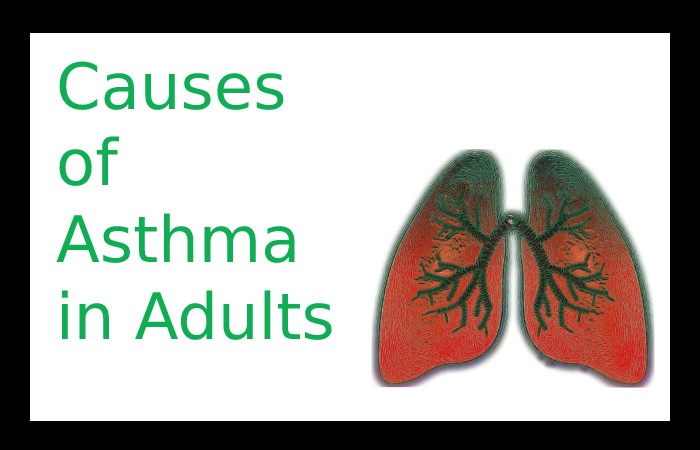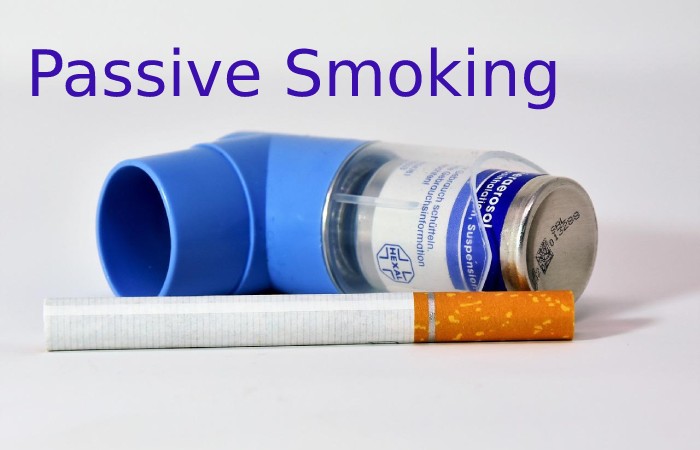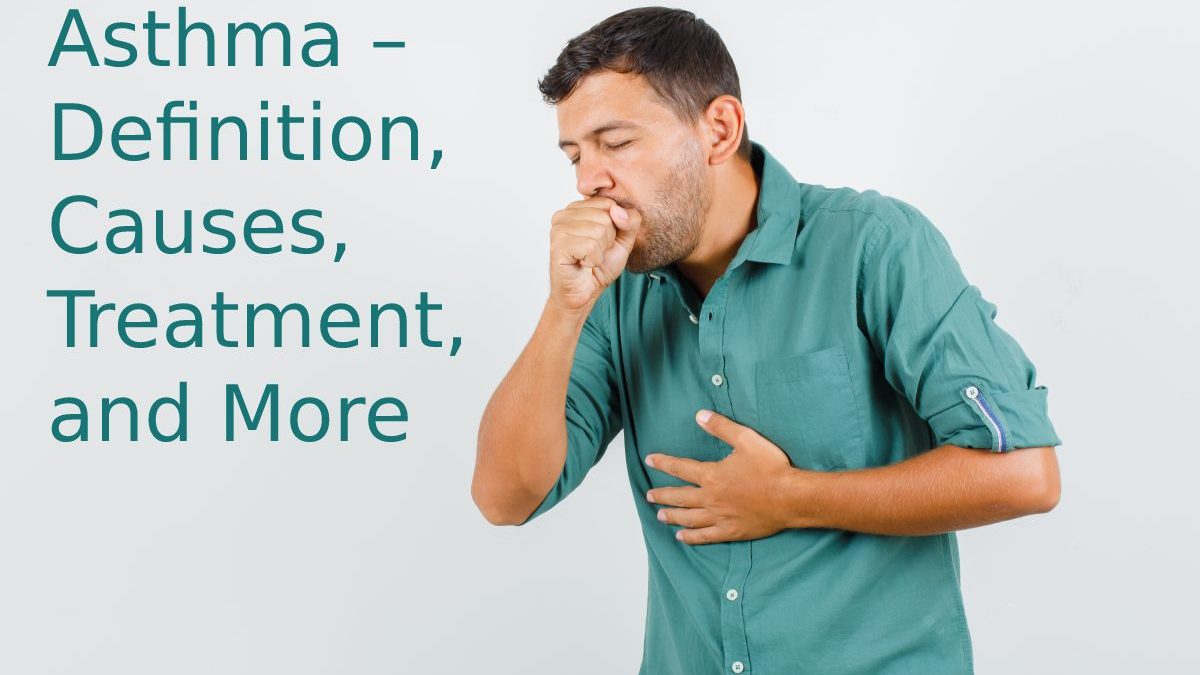Table of Contents
Asthma – Definition
Asthma is a chronic inflammatory disease considered by attacks of shortness of breath, associated with coughing and wheezing. It causes by inflammation and narrowing of the bronchi due to irritation, usually due to an allergy. When the bronchi close, it is difficult to expel air from the lungs, and the patient feels suffocated.
Asthma progresses in flare-ups or attacks that resolve spontaneously or with treatment—symptoms of asthma precipitated by different substances (called allergens) that promote bronchial inflammation. As a result, the patient usually has no symptoms between attacks, and lung tests may be regular.
Asthma can appear in young children (often beginning around three years of age) or adulthood. Many children improve their asthma with age, with symptoms disappearing as they get older, although the disease often recurs in more senior generations.
Causes of Asthma in Adults
There are probably several genetic (inherited) and other environmental factors predisposing to asthma onset. Among the factors that have related to the development of a predisposition to have asthma are:

Atopy
It is the most related factor to the subsequent development of asthma. Atopy is a genetic predisposition to suffer from various allergic diseases, which cause skin scratches (atopic dermatitis or eczema) and affects other locations, such as allergic rhinitis. Not all children with atopy have asthma, but almost all have immediate allergies.
Other genetic factors are independent of atopy. There is also a familial predisposition to the development of asthma in people without atopy.
Environmental Factors
Various hypotheses consider, but none of them are definitively proven:
Hygiene Hypothesis
It indicates that children more exposed to infections develop less asthma.
Diet
Obese people are at higher risk of asthma. In addition, various food associated with a greater or lesser chance of asthma. However, some studies have supplemented these foods and have not shown their effectiveness.
Environmental Pollution
It has a link to the increased frequency of people with asthma identified in recent decades.
Passive Smoking

It is exposure to chemical and biological substances derived from animals. The diagnosis of asthma is clinical. It differentiates from some heart diseases that can cause respiratory distress and wheeze.
The chest radiograph expects. However, the most crucial test for finding asthma is spirometry.
Spirometry involves blowing through a mouthpiece to see how much air expels and how fast it expels. In people with an acute asthma episode, a decrease in the amount of air removed from the lungs during the first and second blowing (FEV1) observes the closure of the bronchi—the test repeats after administering an inhalation of medicine that opens the bronchi, which shows an improvement.
Skin tests are performed on many patients to assess substances that can cause an asthma attack (allergens).
Is it Hereditary?
Patients with asthma have relatives with the same disease more often than others. This data indicates that there is a certain degree of the hereditary component.
What are the Treatments for Asthma?
It is necessary to differentiate between chronic treatment, aimed at averting an asthma attack from appearing, and treatment of the acute affair, aimed at treating the attack already established.
Chronic Treatment
If the allergen responsible for the attack is known, treatment consists of avoiding exposure to it. A desensitizing treatment tried using vaccines that, in general, are not very effective.
Any Smoker with Asthma should Stop Smoking
Inhaled Bronchodilators
It is the most common treatment to control symptoms. They may be:
Beta-2 agonists such as salbutamol, salmeterol, formoterol, etc. Some of them need to be administered every few hours (4 or 6 hours) and have a rapid effect; They are used for quick control of symptoms or to prevent an attack. Others can administers every 12 hours and used preventively. In addition, many of them associates with corticosteroids in the same inhaler, thus reducing inflammation and facilitating control of the disease. The only significant adverse effect they can produce is tremor and palpitations.
It is less effective than beta-2 agonists in controlling symptoms and is usually used in combination when signs not maintain. However, they produce few adverse effects, the most frequent being dry mouth, urinary retention, and glaucoma.
Inhaled Corticosteroids
It is the most effective treatment to control the disease and prevent the appearance of new attacks. However, they can facilitate the development of fungal infections of the mouth (thrush) and produce hoarseness.
In some patients, generally, those not controlled with previous treatments. So there may be an indication.
Some other therapies, such as hypnosis, chiropractic, acupuncture, and yoga, are used in this affected role. However, none of them are effective in scientifically correct studies.
Treatment of a Severe Acute Flare of Asthma
In a severe attack, hospital admission and the administration of:
Oxygen
- Bronchodilators in the form of aerosols.
- Corticosteroids administer by vein.
- Treatment of the disease that triggered the asthma attack (antibiotics if it was an infection, antihistamines if it was an allergen, etc.).
Asthma Prevention
Prevention – Researchers have yet to pinpoint the exact causes, it’s hard to know how to prevent the inflammatory condition. However, more information is available on preventing asthma attacks.
These strategies include:
- Avoid triggers. Stay away from chemicals, odors, or products that have caused you breathing problems in the past.
- Reduce exposure to allergens. If you’ve acknowledged allergens, such as dust or mold, that trigger an attack, avoid them as much as possible.
- Get vaccinate against allergies. Allergen immunotherapy is a treatment that can support and alter the protected system.
With routine injections, your body can become less sensitive to whatever triggers. - Take preventative medications. Your doctor may recommend medications for you to take daily. You can use these medications and the ones you use in an emergency.
When to See a Doctor – Asthma

Until today, there is no treatment for asthma. However, many effective conducts can lessen indications. Routine changes and medications can also help recover the value of a lifetime.
- If you haven’t recognized with asthma but are facing symptoms such as winded, coughing, or smallness of breath, you must tell your doctor.
- The minute you’ve been diagnosed with asthma, you should see your doctor at smallest once a year or more if you have persistent symptoms after by means of some treatments.
Call your Doctor Right Away if:
- You feel weak
- You can’t do your daily activities
- Have wheezing or a cough that won’t go away
Conclusion
It is a provocative illness of the airways that carry air to the lungs. Therefore, it makes breathing hard and can make some physical activities challenging or impossible. It is the most shared chronic condition amongst children in this country: 1 in 12 children has it.
Typically, when you inhale, air passes through your nose or mouth, down your throat and airways, and finally spreads your lungs. Many tiny air pipes in the lungs help carry oxygen from the air into the bloodstream.
Also Read : Can Apple Cider Vinegar for Diet?

